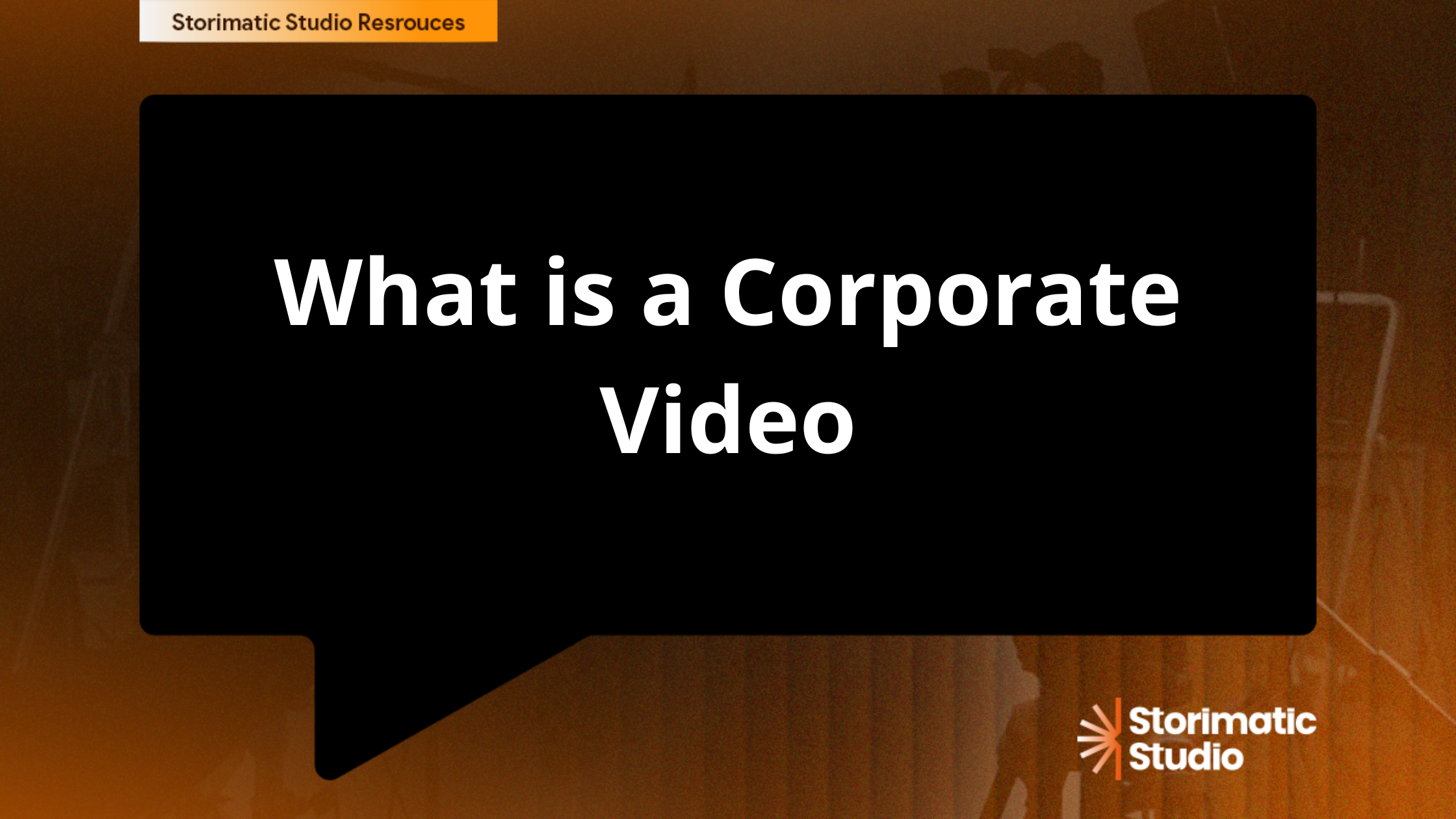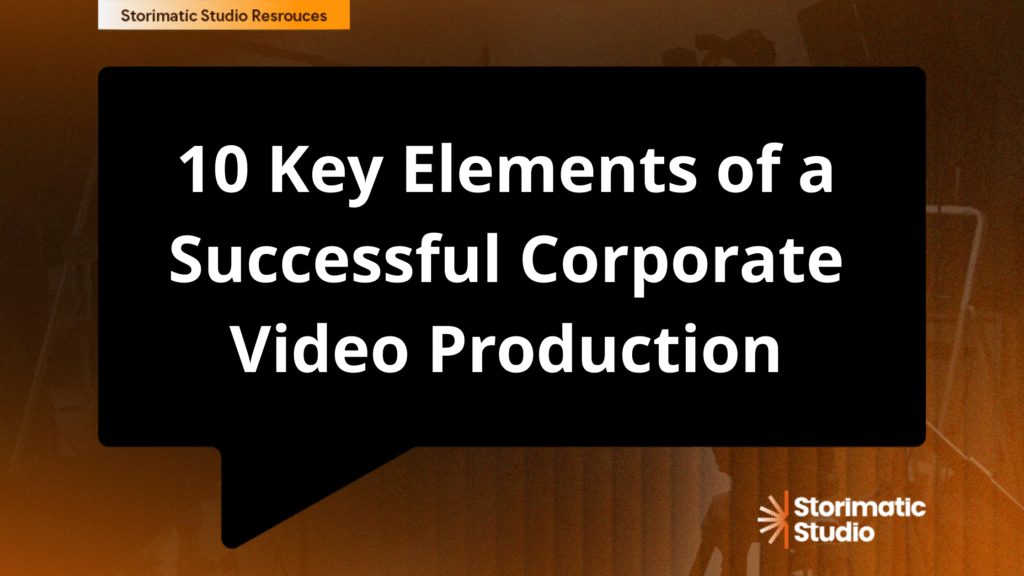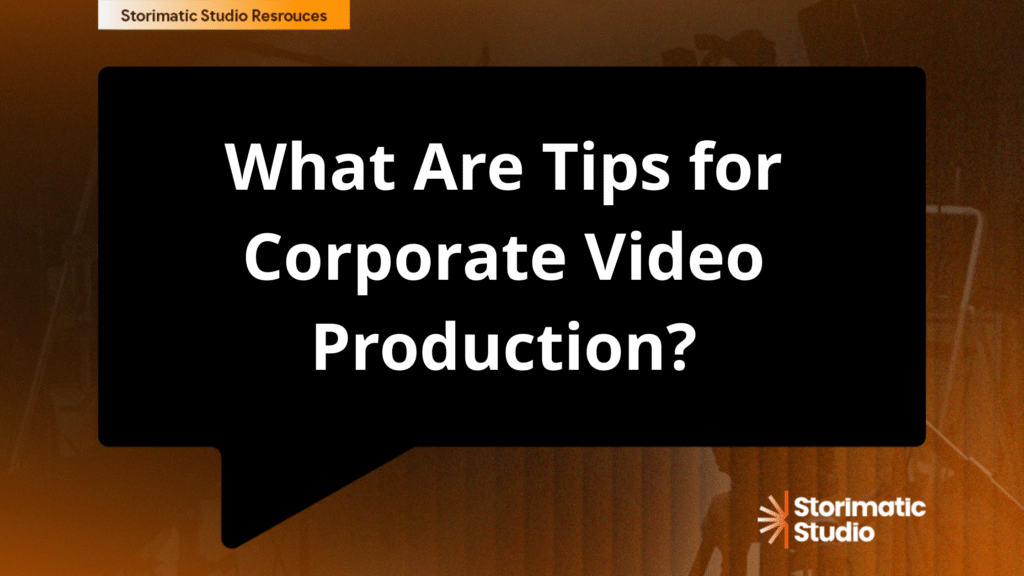Introduction
Corporate videos have evolved from simple company presentations to sophisticated marketing tools that generate measurable ROI. Modern corporate video content drives 1200% more shares than text and images combined, according to Brightcove’s Video Marketing Survey 2024.
Key findings:
- Engagement rates: Corporate videos achieve 80% higher engagement rates on social media compared to static content (Wyzowl Video Marketing Statistics 2024)
- Conversion impact: Companies using corporate videos see 34% higher conversion rates on landing pages (HubSpot State of Marketing Report 2024)
- ROI measurement: 87% of video marketers report positive ROI from corporate video investments, with average returns of $4.20 per dollar spent
- Usage growth: 91% of businesses now use corporate videos as a marketing tool, up from 61% in 2019 (Wistia Video Trends Report 2024)
What Exactly Defines a Corporate Video in Today’s Business Context?
A corporate video is any professionally produced video content created by or for a business to communicate with employees, customers, investors, or other stakeholders for specific business objectives.
Corporate videos encompass multiple formats including company overviews, product demonstrations, training materials, executive communications, and brand storytelling content. Unlike user-generated content or social media videos, corporate videos follow brand guidelines, maintain professional production standards, and align with strategic business goals.
Evidence supporting this definition:
- The Corporate Video Production Association defines corporate videos as “professionally produced content serving business communication needs with measurable outcomes”
- 73% of corporate videos are created for external audiences (customers and prospects), while 27% target internal stakeholders (Vidyard Business Video Benchmarks 2024)
- Average corporate video production budgets range from $1,000-$50,000 depending on complexity and distribution strategy
- Professional corporate videos typically achieve 3x higher completion rates than amateur productions
What Are the Primary Types of Corporate Videos Companies Use?
The six main categories of corporate videos serve distinct business functions, with company overview videos and product demonstrations accounting for 68% of all corporate video content.
Most common corporate video types:
- Company overview videos (32%): Brand introductions typically 2-3 minutes long showcasing mission, values, and capabilities
- Product demonstration videos (28%): Technical showcases averaging 4-6 minutes with feature explanations and use cases
- Employee testimonial videos (15%): Authentic stories from team members to build trust and showcase company culture
- Training and educational content (12%): Internal or customer-facing instructional materials
- Executive communications (8%): Leadership messages for earnings calls, company updates, or crisis communications
- Event and conference videos (5%): Coverage of company events, trade shows, or speaking engagements
According to Forrester’s B2B Video Marketing Report 2024, product demonstration videos generate the highest lead quality scores, while company overview videos produce the broadest reach and brand awareness metrics.
How Much Should Companies Budget for Professional Corporate Video Production?
Corporate video production costs vary significantly based on scope, with most companies spending $5,000-$15,000 for professional quality videos that drive measurable business results.
Budget ranges reflect production complexity, talent requirements, and post-production needs. Simple talking-head videos may cost $1,000-$3,000, while complex multi-location productions with animation and custom music can exceed $50,000.
Detailed cost breakdown by video type:
- Basic company overview (1-2 minutes): $3,000-$8,000 including scripting, single-location filming, basic graphics
- Product demonstration with animation: $8,000-$20,000 for technical explanations, 3D renderings, motion graphics
- Multi-location testimonial series: $15,000-$35,000 covering travel, multiple shoots, consistent branding
- High-end brand film: $25,000-$100,000+ with cinematic quality, original music, professional actors
- Ongoing video content programs: $5,000-$15,000 monthly retainer for regular content creation
The Content Marketing Institute’s 2024 benchmarks show companies allocating 15-25% of their video budgets to distribution and promotion, not just production costs.
What ROI Metrics Should Companies Track for Corporate Video Investments?
Successful corporate video campaigns generate measurable returns through lead generation, brand awareness, and sales enablement, with 83% of marketers saying video provides good ROI.
Key performance indicators vary by video type and business objectives, but engagement metrics, conversion tracking, and sales impact provide the clearest ROI picture. Companies should establish baseline metrics before video deployment and track performance over 3-6 month periods for accurate assessment.
Primary ROI measurement categories:
- Engagement metrics: View completion rates (industry average 54%), social shares, comments, and time watched
- Lead generation: Form fills, demo requests, and email signups attributed to video content
- Sales impact: Pipeline influenced, deal velocity improvement, and revenue attribution
- Brand awareness: Brand mention increases, website traffic lift, and social media follower growth
- Cost efficiency: Cost per lead compared to other marketing channels, typically 20-40% lower for video content
Salesforce’s Marketing Cloud data shows corporate videos in B2B contexts generate leads at $43 per conversion compared to $57 for text-based content marketing.
How to Choose the Right Corporate Video Production Partner?
Selecting an experienced corporate video production company significantly impacts final video quality, project timeline, and overall ROI, with professional studios delivering 73% higher completion rates than amateur productions.
The choice between local production companies and national agencies depends on budget, timeline, and specific industry expertise. Local studios often provide more personalized service and faster turnaround times, while maintaining competitive pricing through lower overhead costs.
Key evaluation criteria for production partners:
- Portfolio quality: Review previous corporate work in similar industries, focusing on storytelling effectiveness and technical execution
- Industry expertise: Partners familiar with your sector understand compliance requirements, technical terminology, and audience expectations
- Full-service capabilities: End-to-end services from strategy development through post-production and distribution support
- Client testimonials: Verified reviews from similar-sized companies with comparable project scopes
- Production timeline: Realistic scheduling that accounts for revision cycles and stakeholder approval processes
- Geographic advantages: Local production companies like Corporate Films Production in Calgary – Storimatic Studio offer benefits including reduced travel costs, easier scheduling for on-site shoots, and familiarity with local business environments
For companies in Western Canada, working with regional production specialists can reduce project costs by 25-40% while maintaining professional quality standards and ensuring cultural alignment with local market preferences.
Corporate Video Type Comparison Table
| Video Type | Average Length | Production Cost | Primary Goal | ROI Timeline | Best Use Case |
| Company Overview | 2-3 minutes | $3,000-$8,000 | Brand awareness | 3-6 months | Website homepage, trade shows |
| Product Demo | 4-6 minutes | $8,000-$20,000 | Lead generation | 1-3 months | Sales presentations, landing pages |
| Customer Testimonial | 1-2 minutes | $2,000-$5,000 | Trust building | 2-4 months | Proposal support, case studies |
| Training Video | 5-15 minutes | $5,000-$15,000 | Education | 6-12 months | Employee onboarding, customer success |
| Executive Message | 3-5 minutes | $4,000-$10,000 | Stakeholder communication | 1-2 months | Investor relations, crisis response |
| Event Coverage | 2-8 minutes | $3,000-$12,000 | Community building | 2-3 months | Social media, recruitment |
Conclusion
Corporate videos represent essential business communication tools that, when properly executed, deliver measurable ROI through increased engagement, lead generation, and brand building. Companies with clear objectives, appropriate budgets, and consistent measurement frameworks see the strongest returns on video investments.
Next steps for implementation:
- Define specific business objectives and success metrics before production begins
- Allocate 15-25% of total budget for distribution and promotion efforts
- Establish baseline performance metrics to measure improvement over time
- Consider starting with a company overview video to test audience response and internal processes
Organizations ready to invest in corporate video content should prioritize professional production quality, clear messaging strategy, and comprehensive performance tracking to maximize business impact.
Frequently Asked Questions
How long should a corporate video be for maximum engagement?
2-3 minutes for external audiences and up to 6 minutes for detailed product demonstrations, based on Wistia’s engagement data showing 65% completion rates at these lengths.
Should companies produce videos in-house or hire external agencies?
External agencies provide better ROI for high-stakes videos, while in-house teams work best for ongoing content creation, according to 78% of marketing directors surveyed by Content Marketing Institute.
What video platforms provide the best analytics for corporate content?
Wistia and Vimeo Business offer the most detailed B2B analytics, while YouTube provides broader reach but limited professional features.
How often should companies update their corporate videos?
Company overview videos need updates every 18-24 months, while product demonstration videos require refreshing every 6-12 months based on feature releases.
What’s the minimum production quality acceptable for professional corporate videos?
1080p resolution, professional audio quality, and consistent branding are non-negotiable minimums, with 4K becoming standard for premium brand positioning.




